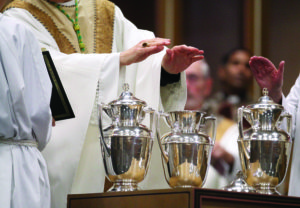 (CNS photo/Karen Bonar, The Register)
(CNS photo/Karen Bonar, The Register)One aspect about Catholicism that is hard to miss is the priesthood. We do not have ministers or preachers, but bishops, priests and deacons. The odd thing is that when you read the New Testament, you do not encounter Christian priests. The only people who are called priests are generally the Old Testament priests who served at the temple. To make matters even more obvious, the New Testament never speaks of bishops, priests and deacons, but only bishops, elders, and deacons.
What happened to the priests?
Part of the problem is that we have forgotten the roots of our English word “priest.” The word “priest” comes from the Germanic “priester,” which is related to the Latin word, “presbyter.” Therefore, our English word “priest” is really referring to “presbyter,” which means “elder.” As you can see, our English throws things a little off, but this is not the case in Latin. In fact, the liturgy speaks of the order of priests in Latin as “... ordo episcoporum, the ordo presbyterorum, the ordo diaconorum” (CCC 1537). Notice that it says bishops (episcoporum), presbyters (presbyterorum) and deacons (diaconorum). Where we in English would say “priests,” the Latin liturgy says “presbyter.” The Catechism goes on to explain:
“... Today the word ‘ordination’ is reserved for the sacramental act which integrates a man into the order of bishops, presbyters, or deacons, and goes beyond a simple election, designation, delegation, or institution by the community, for it confers a gift of the Holy Spirit that permits the exercise of a “sacred power” (sacra potestas) which can come only from Christ himself through his Church” (CCC 1538).
Again, we see the word “presbyter” replacing our English word “priest.” But did the New Testament make the same connection? Are “presbyters” (elders) in the New Testament really ordained priests?
Yes, indeed.
A good example is found in James 5:14-15 where the “elders” or “presbyters” are spoken of as administering the sacrament of the anointing of the sick:
“Is anyone among you sick? He should summon the presbyters of the church, and they should pray over him and anoint (him) with oil in the name of the Lord, and the prayer of faith will save the sick person, and the Lord will raise him up. If he has committed any sins, he will be forgiven.”
Were these presbyters exercising a “sacred power” that comes only from Christ himself through the Church? Yes. Through their prayer of faith and the anointing, the sick person’s sins are forgiven and their health could possibly be restored as well.
The book of Revelation also depicts “presbyters” as priests, but in a more cryptic way. In Revelation 5:8, John sees a vision in heaven of twenty-four presbyters (elders) by the throne of God that are said to have “... held a harp and gold bowls filled with incense, which are the prayers of the holy ones.”
John gives us two important clues that these “presbyters” are priests exercising a priestly role in heaven. The first is that they are offering incense before God. The Old Testament, however, makes it very clear that only priests were allowed to do this. The rebellion of Korah highlights this point.
When Korah and his band rebelled against the leadership of Moses and Aaron, claiming that all the Israelites are holy, Moses understood Korah was making an illegitimate claim to the priesthood, saying: “[God] ... has allowed you and your kinsmen, the descendants of Levi, to approach him, and yet you now seek the priesthood too” (Numbers 16:10).
What was Moses’ solution? He told Korah to offer incense before God and see what happens (Numbers 16:17). If they were priests, there wouldn’t be a problem. But we all know what happened (if not, read Numbers 16:22-35). Even though God said that Israel was to be a “kingdom of priests” (Exodus 19:6-7), only the priests could minister in the temple and offer incense.
 Gary Michuta
Gary MichutaThe second clue is that there were twenty-four presbyters around God’s throne. This number corresponds to the number of priestly divisions designated to serve in the temple (1 Chronicles 24:1-31). Since these twenty-four presbyters are offering incense before God, we see that these presbyters are in fact priests.
Gary Michuta is an apologist, author and speaker and a member of St. Michael the Archangel Parish in Livonia. Visit his website at www.handsonapologetics.com.









